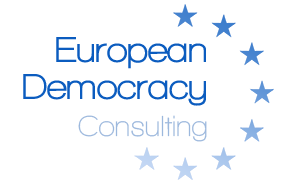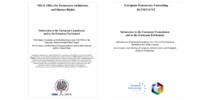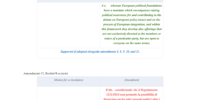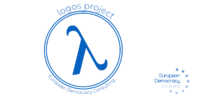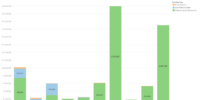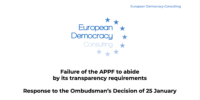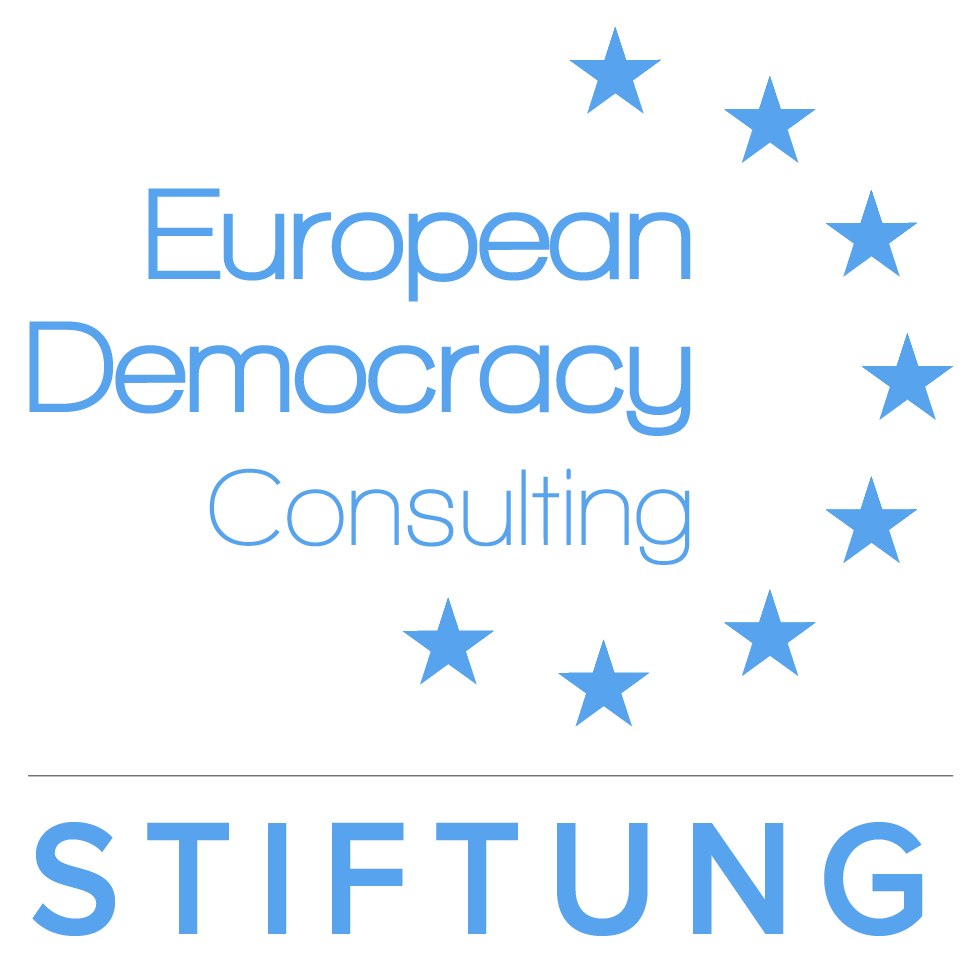After contributing to discussions in the European Parliament and to consultations organised by the European Commission, European Democracy Consulting provides a full assessment and analysis of the European Commission’s proposal for a revision of Regulation 1141/2014 on European political parties and European political foundations. Find the PDF report here.
Context
On 26 October 2021, the Committee on Constitutional Affairs (AFCO) of the European Parliament adopted a report on the implementation of Regulation 1141/2014 on European political parties and European political foundations, in line with its Article 38 mandating the report. The European Commission subsequently published its own report on the implementation of Regulation 1141/2014 and a proposal to amend this Regulation.
European Democracy Consulting’s assessment analyses the European Commission’s proposal to amend Regulation 1141/2014. As with all contributions from European Democracy Consulting, it is based on applicable national best practices and relevant data analysis. In particular, it makes uses of previous research and work undertaken by European Democracy Consulting, including our Comments on Reforming Regulation 1141/2014, written for the OSCE Office for Democratic Institutions and Human Rights and based on the joint Guidelines on Political Party Regulation of the OSCE/ODIHR and of the Venice Commission,1 our response to AFCO’s draft report on the implementation of Regulation 1141/2014, the Logos Project on the visibility of the link between European parties and their member parties, our analysis of European parties’ donations and contributions, a case opened by the European Ombudsman on the transparency of information published by the Authority on European Political Parties and European Political Foundations (APPF) following a complaint by European Democracy Consulting, and our policy brief on a smarter funding system for European parties published by the Austrian Society for European Politics (Österreichische Gesellschaft für Europapolitik, ÖGfE).
Click on the thumbnails to explore the research and work carried out by European Democracy Consulting
Written in a non-technical manner, this work is intended to provide context, analysis and feedback on the proposal of the European Commission, and to inform current and upcoming discussions in the European Parliament and Council of the European Union. More technical details can be found in our Comments on Reforming Regulation 1141/2014, as well as in our seminal report on the reform of European political parties (available online soon). As always, our analysis focuses mostly on European parties, less so on European foundations.
Note: in the document below, the numbering of articles used is the new numbering in use in the European Commission’s proposal.
What the reform proposal does, which is welcome (…with caveats)
The first part of our analysis concerns amendments proposed by the European Commission which mostly improve the regulation and functioning of European political parties. While not perfect solutions, these are clear steps forward that the Commission should be commended for.
Regulating political advertising
The Commission has placed great emphasis on increasing the transparency of paid political advertising, which leads to a number of changes in the Regulation.
Article 2(16) through (18) introduce a definition of political advertising, political advertisement, and political advertising services by referring to an upcoming Regulation on the transparency of paid political advertising. An amended Article 4 also stipulates that the statutes of the European political party must include internal rules for the use of political advertising.
The core of the reform is found in a new Article 5, which requires European political parties to 1) ensure that their providers of political advertising services fully comply with obligations under the upcoming Regulation on political advertising, 2) provide the APPF with information on political advertising within 5 days of the first dissemination, and 3) establish and keep up-to-date a policy for the use of political advertising, along with an annual report available on the European party’s website. Article 5 also requires the APPF to immediately publish the information on political advertising provided by European parties and establishes an obligation for Member States to designate national regulatory authorities competent to supervise compliance.
The APPF is also tasked, in Article 13, with preparing an annual report on the political advertising activity of European political parties, and Article 21 requires European parties to include evidence, in their applications for funding, that they maintain an updated policy on the use of political advertising and that this policy has been implemented.
However, while Article 5 specifies that information published by the APPF be “presented in a form which is easily accessible, clearly visible and user friendly, and using plain language”, it does not require data to be published in an open and machine-readable format, as the European Ombudsman required of the APPF for financial data. Regulation 1141/2014 had also previously requested that national parties display the logo of their European party of affiliation in a “clearly visible and user friendly” manner, which the APPF never enforced, despite clear failures to meet this standard. It is therefore unsure whether this language alone is sufficient to make this information truly visible and understandable by citizens.
Finally, with regards to the APPF’s annual report on political advertising, while the wording is unclear, the description of this report in the Regulation seems limited to a factual summary of European parties’ own reporting and to decisions taken by national authorities – thereby giving no role to the APPF beyond reporting. The Commission’s own summary refers to them as “descriptive” reports. Empowering the APPF to assess the practices and compliance of European parties would be a welcome development.
Increasing transparency
Article 36 on transparency is amended to require the publication of information in an open, machine readable format. This was a clear demand by European Democracy Consulting in its complaint against the APPF to the European Ombudsman. Additionally, the amended Article 36 requires the publication, in the 6 months ahead of European elections, of the weekly reports on donations and expenditure received by the APPF from European parties.
However, the wording of this last requirement fails to clearly set a timeframe for the publication of these weekly reports, which may all be published just before election day, defeating the purpose of this transparency measure. A simple correction should ensure that this information is published “immediately” or within a fixed number of days following its receipt by the APPF (even in cases where the information received is incomplete).
More worryingly, the amendment of Article 36(1) maintains the reporting obligation on “the European Parliament, under the authority of its Authorising Officer or under that of the [APPF]”. In doing so, it fails to clearly attribute the publication of specific items either to the European Parliament or to the APPF. In the past, this has led to information under Article 36 not being published, as highlighted by European Democracy Consulting in its complaint to the European Ombudsman.
The new article also keeps the unclear requirement for both organisations to publish information “on a website created for that purpose”. While seemingly aimed at ensuring that all information under Article 36 is provided on a single website – an important element for citizens’ easy access to consolidated information – this has not prevented information from being spread between the APPF’s own website and a less-than-visible page on the European Parliament’s website, under its “contracts and grants” sub-website, as neither organisation took responsibility for the management of that single website.
Finally, with regards to Article 36’s requirement to publish the number of individual members of European parties and the list of MEPs with their European party affiliation and the list of legal persons who are members of a European party, the revised articles does not indicate that the APPF and European Parliament should keep previously published figures available online. Under the current framework, each update replaces previous figures – thereby depriving citizens of any understanding of how these figures have evolved over time.
Strengthening the link between European parties and their member parties
Regulation 1141/2014 already required European parties to provide evidence, in their applications for funding, that their member parties continuously display, on their website, the logo of their European party of affiliation “in a clearly visible and user-friendly manner”. However, according to European Democracy Consulting’s Logos Project, up to 85% of member parties’ website did not display the logo of their European party of affiliation in a clear and user-friendly manner.
Despite this lack of implementation, no sanctions (by way of denying European parties’ applications for funding) were ever imposed. It is assumed that cutting off European parties’ public funding was far too harsh a sanction. Another issue was Regulation 1141/2014’s lack of information on what actually constitutes a “clearly visible and user-friendly” display.
The Commission therefore proposes to amend Article 4(1) to indicate that European parties’ statutes must include “a requirement that member parties display the European political party’s logo in a clearly visible and user-friendly manner, specifying that it is to be located in the top section of the front page of the member party’s website and in an equally visible manner as the member party’s own logo.” These precisions constitute a very welcome development for the assessment of the implementation of the requirement.
Additionally, Article 21, on applications for funding, is amended to reflect that European parties must provide evidence demonstrating that their member parties comply with visibility requirements in Article 4(1). Article 30 is also amended to provide sanctions for failure to implement Article 4(1) and to provide evidence under Article 21(3).
However, from the drafting of the amendments, we note that Article 30 applies sanctions in two cases: 1) if European parties fail to include relevant provisions in their statutes (cf. Article 4(1)), and 2) if European parties fail to provide evidence, in their applications for funding, that their member parties display the logo of their European party of affiliation in line with the criteria of Article 4(1) (cf. Article 21(3)).
Given past reluctance to challenge European parties’ evidence, and while the more precise wording of Article 4(1) provides a more solid legal basis, this phrasing still risks creating a loophole whereby a European party actually has relevant provisions on the display of its logo by its member parties in its statute and actually provides evidence of display, but the display is not up to par with the provisions of Article 4(1).
We therefore continue to support removing the reference to the display of logos from the applications for funding, in order not to rely on evidence provided by European parties, but instead entrusting the APPF with periodic and unannounced verifications that European parties’ member parties do indeed display the logo and political programme of their European party of affiliation on their website. The APPF should also regularly ensure that relevant provisions under Article 4(1) are complied with, which means adding point (i) of Article 4(1) to the list of verifications made by the APPF in Article 7(2).
At any rate, European parties’ applications for funding must be made public immediately upon receipt by the APPF in order to allow public scrutiny of the evidence provided – an element that both dramatically hampered the Logos Project and made it all the more relevant.
Supporting gender equality
To promote gender equality, European political parties are required, under a revised Article 4, to include internal rules on gender equality in their statutes. As for the display of logos, Article 21 is also amended to request European parties to provide evidence, in their applications for funding, that their member parties display, on their website, information on gender representation among their candidates at the last European elections, as well as on the evolution of gender representation among their elected MEPs. Likewise, Article 30 is amended to provide for sanctions for failure to comply with Article 4(1) and Article 21(4).
While fines remain low, it is a step in the right direction to request information on gender representation from member parties and to provide for relevant sanctions.
However, Article 4(1) contains no indications on the content of the internal rules that European parties should include in their statutes and, just like for the display of logos, it is likely that any provision – regardless of its actual content – will be considered sufficient to avoid sanctions. Therefore, just like the Commission is now providing for specific details regarding the display of logos, Article 4(1)(j) should include baseline elements to be included in European parties’ internal rules on gender equality.
Secondly, in addition to member parties publishing information on the gender representation among their candidates and MEPs, Regulation 1141/2014 should require European parties themselves to publish information on the gender representation among their candidates and MEPs. Even though candidates are chosen by member parties, their supposed membership of European political parties is key to European parties receiving public funding. European parties should therefore take ownership of their candidates and MEPs, and provide information on them.
Finally, just like for the issue of the display of logos, we recommend removing the publication requirement from the list of elements to be included in European parties’ applications for funding, and instead set this as a separate obligation subject to periodic and unannounced verifications by the APPF and to sanctions in case of failure to comply.
Allowing European parties to act in referendum campaigns
Quite astonishingly, Regulation 1141/2014 forbids European political parties and foundations to use any of their funding – public or private – to finance referendum campaigns. The Commission proposes to amend Articles 24 and 25 in order to allow European parties and foundations to finance referendum campaigns “when those campaigns concern the implementation of the Treaties of the Union”. This proposal is a step in the right direction.
Of course, the full strength of this provision will be known only by a clarification of what it means for a referendum to “concern the implementation of the Treaties”. Already, we note that this provision is not limited to referendum campaigns on the adoption or ratification of EU treaties, but the notion of “implementation of the treaties” can nevertheless vary widely in scope.
Most importantly, we regret the Commission’s decision not to seek to allow European political parties to directly contribute, by way of funding, to political action across Europe. Politics goes well beyond referendum campaigns and European parties, as political parties, should be able to support their national members, candidates and elections across the continent – at the very least for European elections.
Simplifying accounting standards
Regulation 1141/2014 currently requires the provision of annual financial statements both “in accordance with the law applicable in the Member State in which they have their seat” and “on the basis of the [IFRS] international accounting standards”. European political parties have long complained about this double reporting requirement and the needless administrative burden it imposes, in particular on smaller parties.
In its proposal, the Commission amends Article 26 to remove the requirement for European parties to provide annual financial statements using the IFRS standards, often considered overly complex and not suited to structures such as political parties.
Unfortunately, by getting rid of the IFRS and retaining reporting in line with the law of the Member State where European parties have their seat, the Commission trades uniformity for simplicity, as not all European parties will report using the same format. Another proposal would have been to submit all European parties to a common European standard suited to non-profit structures, and therefore applicable to European parties and, once this status is created, to a new class of European NGOs which has long been under discussion.
Enabling private funding via own resources
The reform proposal introduces a new category of revenue – in addition to contributions (from party members) and donations (from non-members) – for financial income created by parties or foundations. This is very welcome development, allowing European parties to generate supplementary private revenue. These “own resources” are defined in Article 2(9) and regulated in Article 23. Unfortunately, they are capped at 5% of European parties’ or foundations’ budgets, a very low level unable to substantially affect European parties’ over-reliance on public funding.
Additionally, Article 23 is amended to empower the APPF to request additional information from European parties or foundations, as well as directly from their donors, where it has grounds to believe that a donation was granted in violation of the Regulation. This extension in investigative powers of the APPF is a welcome development.
What the reform proposal does, which won’t change much at all
This second section lists amendments proposed by the Commission which, because of their drafting or focus, are not expected to have any meaningful impact on the regulation of European parties. In most cases, actual change is needed and the Commission’s proposal therefore falls short of ensuring this change. We propose avenues for review.
Amending definitions
The definition of ‘European political party’ in Article 2(3) now mentions that European political parties must “aim to pursue [their political objectives] across the Union”. This is meant to reflect European parties’ role in cross-border campaigns in the EU. In practice, however, this does nothing to support European parties in campaigning across Europe, as it merely states that they should aim to pursue their objectives across borders.
The definition of ‘European political foundation’ in Article 2(4) is amended to mention that foundations may contribute to “capacity building activities that could help form future political leadership in Europe.” While broadening the scope of activities of European political foundations, it is unclear what tangible impact this wording will induce.
Pushing for the respect of EU values
Article 3(1) and (2) are amended to clarify that the obligation to comply with values on which the Union is founded (Article 2 TEU) not only applies to European political parties and foundations, but that a European party and foundation should also “ensures that [the respect of EU values] applies to its member parties”. However, these provisions merely request European parties and foundations to provide written declarations.
According to Article 11, the Authority may decide to de-register a European party or foundation on grounds of non-compliance with EU values, but this must be done “having regards to” the opinion of the Committee of Eminent Persons referred to in Article 14. Meanwhile, Article 14(2)(a) only enables the Committee to give an opinion on non-compliance “by a European political party or a European political foundation”, and not by one of their members. It is unclear whether this is the result of an oversight, or whether a decision to de-register a European party simply cannot be taken based on the actions of one or more of its member parties.
Additionally, we note that the amended Regulation does not empower the APPF to seize itself of issues of non-compliance (instead still needing a request from the European Parliament, Commission or Council to, in turn, ask the Committee of Eminent Persons for an opinion), even though both the Parliament and the Council are conferred a right of veto over a decision of de-registration in Article 11(4).
Finally, the effectiveness of the current procedure for the evaluation of non-compliance issues is seriously in doubt, as no opinions have ever been requested from or issued by the Committee of Eminent Persons, and, to this day, the European Commission still has not appointed its two members – which is mandated by Regulation 1141/2014 to take place within six months of the first session of the European Parliament following European elections (or 4 January 2020).
Improving provisions on funding
Regulation 1141/2014 contains a loophole regarding whether or not an expenditure is eligible for EU funding during the 3-month period when de-registration decisions have been made but have not yet entered into force. Articles 10 and 19 are amended to eliminate this 3-month period and protect the Union’s financial interests. To date, three European political parties have been de-registered,2 two of which had received public funding from the European Union, with only limited amounts involved.
Additionally, in order to “close loopholes in the transparency regime for donations”, an amendment of Article 23 requires European parties to carry out due diligence in order to identify their donors for donations above €3,000.
However, while due diligence measures are welcome, there are limits to the impact of this provision. Firstly, the phrasing of this provision only seems to affect single donations and not the yearly sum of donations from a given donor, meaning it can be circumvented by breaking down a larger donation into two or more smaller ones.
Secondly, given the limited weight of private donations compared to member contributions – let alone as a share of European parties’ total income – as shown by European Democracy Consulting’s recently-updated review of donations and contributions in 2018-2020, the amounts concerned are relatively minor. Based on European Democracy Consulting’s analysis of APPF data across 2018 and 2020, only four European parties received private donations above €3,000, for an average yearly amount of just over €300,000 (for all four parties combined). Out of that amount, over half came from single individuals or other already clearly identifiable actors (such as Microsoft, Google, Uber, etc.), further limiting the real impact of this provision. Finally, these donations were published by the APPF as yearly sums per donor, meaning each may be composed of smaller single donations that may not even meet the threshold of Article 23 and therefore lend themselves to the proposed due diligence measures.
A more thorough review of measures contributing to financial transparency should have included a lowering of the threshold under which donations are gathered as “minor donations” (currently at €3,000), the publication of single donations per donor instead of yearly aggregates, and the publication of separate member contributions (including a distinction between individual members and member parties) instead of a sum total of contributions. For instance, in 2018-2020, ALDE received 1.250 unidentified minor donations for only 22 donors with yearly donations above €3,000; likewise, the EGP received 381 unidentified minor donations, but not a single donation above €3,000.
Finally, the reporting of financial data must be greatly improved. As now proposed by the European Commission, all financial information must be provided in open and machine-readable format; this is a welcome development. Just as importantly, the timing of reporting by European parties and of publication by the APPF must be constrained. Currently, European parties have six months to provide this information – the same time frame as to provide their full financial statements, even though reporting on donations and contributions requires no analysis. For its part, the APPF has no time limit for its publication of this data. As a result, figures on contributions and donations for the year 2020 were not published by the APPF before 21 December 2021(and is still incomplete as of February 2022), and the same information for 2019 was only made available in February 2021.
Modulating sanctions
According to the European Commission, Article 30 is amended to “modulate the sanctions that the APPF can impose” and make the sanctions regime “more proportionate and fit for purpose” in case of non-quantifiable infringements.
By this, the European Commission means that the proposed revision systematically downgrades proposed sanctions. Where a fine of 5% of the annual budget of the infringing European political party or foundation was in force, the proposal now reads “up to 5%”. Where the Regulation ensured 7.5% in case of concurrent infringements, the proposed revision allows “from 5% to 10%”, and, where 20% was imposed for repeated infringements, it now proposes “from 10% to 15%” – with only “from 15% to 20%” in case of further infringements.
Encouragingly, the Commission’s proposal includes, as new non-quantifiable infringements, the failure to include necessary provisions in European parties’ statutes on the display of European parties’ logos by member parties on their website and rules on gender balance (both in Article 4), as well as the failure to provide evidence, in European parties’ applications for funding, on the use of European parties’ logos and the publication of their political programmes by member parties, as well as on gender representation (both in Article 21).
However, as highlighted by European Democracy Consulting’s Logos Project, the provision of “evidence” by European parties, in their applications for funding, of the display of their logo on the websites of their member parties was never the issue. The real shortcoming was that the evidence in question was taken at face value, and that no attention was paid to whether or not the display of the logos was truly in a “clear and user-friendly manner”. As a result, up to 85% of member parties’ website did not display the logo of their European party of affiliation in a clear and user-friendly manner.
Therefore, merely proposing sanctions for the provision of evidence is unlikely to address the manner in which these provisions are actually implemented. It is good that Article 21 refers directly to Article 4(i) which states the manner in which the logo must be displayed; however, it remains unclear, in the proposed amendment, whether a failure to implement these recommendations will actually lead to a sanction – currently, it seems like only the inclusion of provisions on European parties’ statutes and the provision of evidence are subject to sanctions.
The one silver lining seems to be the extension of the limitation period from five to ten years from the date of commission of the infringement (or, for continuing or repeated infringements, from the moment those infringements ceased).
Overall, the only reason this section finds itself in the “won’t change much” category is that, to this day, not a single sanction has ever been imposed by the APPF on a European political party or foundation.
What the reform proposal does, which is not welcome
This next section assesses proposals of the Commission which, based on best practices on political parties and on the joint Guidelines on political party regulation of OSCE/ODIHR and the Venice Commission, we consider clear steps back for the strengthening and democratising of European political parties. Whilst aware that these proposals have garnered support from a number of European parties, we explain why these reforms should be reversed.
Allowing contributions from non-EU member parties
Regulation 1141/2014 does not explicitly allow European parties to collect contributions from individual members citizens of non-EU Member States or member parties whose seat is outside the EU. However, in 2020, a judgement of the General Court confirmed that “citizens”, in Regulation 2004/2003 (the predecessor of Regulation 1141/2014), are “citizens of the Union” and that a party outside the EU did not fall under the definition of a ‘political party’ under Regulation 2004/2003. Consequently, payments from member parties located outside the EU cannot be considered as contributions, but only as donations (and are, therefore, subject to their more stringent ceiling).
Without further explanations, the European Commission concludes that this situation prevents European parties from developing stronger ties with like-minded members outside the EU. It therefore proposes to amend Article 2(8) and Article 23(9) and (10) to explicitly allow European political parties and foundations to collect contributions from member parties located in countries belonging to the Council of Europe.
In order to mitigate the risk of foreign interference and to ensure proportionality, contributions from members outside the EU are capped at 10% of total contributions (which, in turn, are capped to 40% of the annual budget of the party or foundation).
Whilst mindful that, in the wake of Brexit, European parties have almost unanimously deplored the impossibility to receive contributions from member parties outside of the EU (most importantly, from the United Kingdom), this limit is but the natural consequence of the borders of the European Union and of the political union it forms. Citizens and groups of citizens belonging to the Union should be able to contribute to the financing of European political life, while citizens and groups of citizens not belonging to the Union should not. This links to the OSCE/ODIHR Guidelines on political party regulation, which state (in a generic phrasing written for nation states): “As to the non-citizens who do not reside in the country, they should be treated in the same way as any other foreign person, without exception based on emotional ties, ethnicity, or family history.”
Interestingly enough, the Commission’s proposal only opens the door to member parties located in countries belonging to the Council of Europe, but not to individual members citizens or residents of countries belonging to the Council of Europe. While in line with the OSCE/ODIHR Guidelines, this omits the fact that the funds from political parties of non-EU Member States either stem from public funding from non-EU Member States or from the financial contributions of citizens from non-EU Member States, making the Commission’s choice seem arbitrary.
Overall, a reform aimed at strengthening the coherence of the EU’s political union should have explicitly prevented contributions and donations from political parties outside of the European Union and from citizens of non-EU Member States not participating in European elections. At any rate, there are many non-financial ways for European parties to develop strong ties with like-minded members outside the EU.
Lowering the co-financing rate
Currently, Regulation 1141/2014 sets out a co-financing rate of 10% and 5% for European political parties and foundations, respectively, that they must match to benefit from the maximum amount of the contribution from the EU budget available for them.
Arguing that European parties, in particular the smaller ones, face difficulties in collecting the necessary resources to match this co-financing rate, the Commission proposes to amend Article 20(4) to reduce the rate for European political parties to 5%, and even to 0% in the year of the elections to the European Parliament.
Firstly, our data analysis of European parties’ donations and contributions does not find that smaller parties are facing more difficulties in raising private funds as a share of their budget. While differences are small and not always consistent, smaller parties actually tend to receive a slightly higher share of their income from private sources, undermining the Commission’s argument.
Secondly, looking back, we see that, in 2004, Regulation 2004/2003 set this co-financing rate, for European parties, at 25%. In 2014, the original text of Regulation 1141/2014 brought it down to 15%. Four years later, in 2018, an amendment to Regulation 1141/2014 brought it further down to 10%. Merely three years later, the Commission now proposes yet another reduction – down to 5%, and even 0% in election years.
Not only is this trend clearly not sustainable, but, if none of the previous attempts to support private financing by reducing the co-financing rate have failed, it is highly uncertain that one more reduction will be successful.
Even more worrisome than the limited rate of success of this measure is the increasing lack of reliance of European political parties on private funding, in particular small individual donations, which are key to creating ties between political parties and citizens. Bringing down this rate will further entrench the disconnect between European citizens and their parties – this is particularly true by bringing the rate down to 0% in elections years, when European parties should most reach out to citizens as part of their campaigns.
Of course, European parties’ struggles to raise private funding are to be listened to, but more effective and sustainable ways forward are not to almost eliminate parties’ need to raise private funds, but instead to encourage and allow them to reach out to citizens. In this sense, tying part of European parties’ amount of public funding to the private funds they raise, ensuring that national parties properly display their affiliation to European parties at all times, having European citizens vote European parties and lists at European elections, and allowing European parties to truly reach out to citizens at the local level are all much more effective ways to support European parties in their outreach to citizens.
What the reform proposal fails to do
Finally, this last section provides an overview of a number of issues that the European Commission’s proposal fails to address. Given the number of these recommendations and the amount of detail needed for their proper explanation, we here limit ourselves to a brief description and provide links to relevant documents for more information. We are convinced that these reforms are essential in properly reforming European parties and the European party system to better represent and serve European citizens.
- Streamline the definition of European parties: European political parties, like all other parties, including in other multi-level political systems, should be defined, first and foremost, as associations of citizens. By contrast, their current definition as associations of national parties and/or citizens has led them to become “parties of parties”, with no role whatsoever for individual members.
- Simplify the registration of European parties: the current criteria for the registration of European parties – which requires electoral success in seven Member States – is overly convoluted and hampers the expression of European citizens’ political pluralism. Instead, citizens should be able to register a European party with a given number of individual members (see more details here) from no more than two or three Member States.
- Strengthen and streamline European parties’ structure: the current text of Regulation 1141/2014 contains no provisions for the implementation of minimum principles of internal democracy, nor for a rationalisation of European parties’ structure. These provision could include the election of parties’ top leadership by individual members (see more details here), giving European parties a central role in European elections, limiting European parties’ number of affiliated parties to one per Member State, harmonising party names across Europe, and allowing cross-financing between European parties and their member parties.
- Ensure a level playing field for smaller parties: while the public funding of European parties does comprise a lump sum attributed equally to all parties qualifying for European funding, many obstacles remain in order to truly provide a level playing field and ensure political pluralism. For instance, Regulation 1141/2014 could be amended to remove the criteria of representation in the European Parliament needed to access European public funding, reassess the amount of the lump sum (see more details here), create special and time-limited rules for new parties to facilitate the emergence of newcomers (see more details here), introduce an electoral kit for European elections which would include election-related funding and services, and replace MEP-based funding with vote-based funding to reward electoral performance (see more details here). Should public funding remain based on European parties’ number of MEPs, it is essential to clarify their membership status.
- Improve the structure of European public funding: in addition to favouring larger parties, the current structure of European public funding fails to sufficiently support the activities of European parties and is not designed to provide beneficial incentives and rewards. Instead, Regulation 1141/2014 could make the public funding of parties independent from partisan pressures, simplify the distribution of public funding by considering European parties the willful recipients of public funding unless they opt out, increase the overall amount of European public funding (see more details here), provide financial stability by relying on fixed amounts instead of percentages, introduce individual member-based funding to reward citizens’ participation (see more details here), use a matching fund to reward private funding (see more details here), use funding conditionality to support specific policy goals and values, such as gender balance, and review the notion of “reimbursable expenditure”.
- Review rules on donations and contributions: beyond the issue of donations and contributions from non-EU Member States are a number of improvements the Regulation could benefit from. For instance, the Commission should rephrase the provision on ceilings for contributions from member parties, clarify the scope of donations and contributions, redefine categories of private funding, revise donations from legal persons (see more details here), and improve the regulation of loans.
- Ensure the visibility and transparency of information on European parties: European citizens are by and large unaware of their European parties and the review of Regulation 1141/2014 is an opportunity to help connect with European parties. For instance, the Regulation should rephrase the “single website” requirement for the publication of information, clarify and expand the information to be published under Article 36 on transparency, require information to be published in open and machine-readable formats, require the visual display of information, especially financial information, increase the data on the visibility of European political parties, and provide for yearly reviews of the implementation of transparency requirements.
- Improve financial transparency: while substantial information is provided by European parties on the state of their finances, a lot remains to be done in order to make this information visible and readable for citizens. For instance, European parties could be requested to provide a financial summary, the timing and modalities of financial reporting and of electoral financial reporting should be improved, and financial information should be provided visually; and finally
- Strengthen the APPF and improve its functioning: the APPF has a critical but undervalued role in the monitoring of European parties. It should be strengthened, expanded, and required to work from a user perspective. For instance, the European Commission could propose to increase the budget of the APPF, make the APPF the single monitoring entity for European political parties and enhance its oversight functions, strengthen the sanctions regime, include time limits for the publication of information by the APPF, and entrust the APPF with a clear mission of public information.
Overall, the European Commission’s proposal for the reform of European political parties provides a useful basis for discussions in the European Parliament and in the Council. However, much remains to be done for the proper enhancement, strengthening and democratisation of European political parties and the European party system.
- Joint Guidelines of the OSCE/ODIHR and the Venice Commission on Political Party Regulation (2nd edition, 2020), CDL-AD(2020)032, available at https://www.legislationline.org/odihr-documents/page/guidelines and https://www.venice.coe.int/webforms/documents/default.aspx?pdffile=CDL-AD(2020)032-e
- The Alliance for Peace and Freedom, the Alliance of European National Movements, and Europa Terra Nostra.
